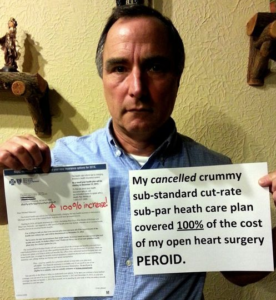06 Dec 2013 Health Care Odds & Ends
MyCancellation Town Hall. The Independent Women’s Voice is kicking off a town-hall tour of its “My Cancellation” project this Saturday:
My Cancellation town-hall tour will begin on Saturday, December 7th at 12:30pm at the College of DuPage in Glen Ellyn, Illinois. The panel will feature healthcare policy expert Naomi Lopez of the Illinois Policy Institute, insurance leader C. Stephen Tucker of Small Business Insurance Services, Inc., and medical professionals.
IWC will be holding other town halls in North Carolina, Louisiana and Arizona. More details here. And also visit MyCancellation.com to see lots of photos of people with their insurance cancellation notices. Here’s one of my favorites:

2. Sen. Harry Reid Repeats The Lie. No description is necessary. Just watch the clip:
3. Hey Doc, You Don’t Mind Treating Me For Free, Do Ya? It’s The Law. Will this lead to a flood of doctors going to “all-cash” practices? One can hope. From Michelle Malkin:
The Affordable Care Act created a 90-day grace period before insurers can drop patients who fall behind on premiums. So, delinquents who obtain tax-subsidized health insurance through an Obamacare health insurance exchange have three months to settle up their bills prior to their policy being canceled. As written, the law puts insurers on the hook for the grace period.
But the bureaucrats at the Centers for Medicare and Medicaid Services decided to issue a rule in March making insurers responsible only for paying claims during the first 30 days of the debtors’ grace period. Who’s on the hook for the other two months? Well, customers are entrusted to foot the bills for additional services. But if they blow off the payments, it’s up to physicians and hospitals to collect.
In real-world practice, this means providers will be eating untold costs.
4. How To Opt Out Of Obamacare. I’ve never liked the idea of encouraging young people to protest Obamacare by forgoing insurance. But Sean Parnell lists way to opt out of Obamacare—i.e., not purchase insurance on the exchanges—and still get health coverage. Here’s one option:
Buy a short-term health insurance policy. These policies usually last between 1 and 11 months (6 months seem to be standard) and are not regulated under Obamacare, and therefore don’t offer the same high level of benefits that can drive up costs. Deductibles are available that are higher than what is allowed with Obamacare-compliant health insurance, leading to further savings. They can typically be renewed at the end of the policy, although it is a new policy that won’t cover any conditions that occurred under the previous short-term policy. Another limitation is that they often can’t be renewed over and over again, it looks like 3 years of coverage is about the maximum. But they are much less expensive than conventional health insurance, and can be a good option for covering major medical expenses.
For more options, visit Parnell’s blog, The Self-Pay Patient.
5. They’re Enrolled In Medicaid…Or Not. You’ve probably already read that the federal exchange is having trouble getting the proper enrollment information to private insurers. As a result, up to one-third of people who have chosen a private plan on the exchange may not end up not being enrolled. Well, it turns out the federal exchanges are having a similar problem with Medicaid enrollment:
 People shopping for insurance on the federal marketplace may be informed they’re eligible for Medicaid and that their information is being sent to state officials to sign them up. However, states aren’t able enroll them because they’re not receiving usable data from the Obama administration….
People shopping for insurance on the federal marketplace may be informed they’re eligible for Medicaid and that their information is being sent to state officials to sign them up. However, states aren’t able enroll them because they’re not receiving usable data from the Obama administration….
The problem with Medicaid coordination could affect tens of thousands of applicants and represents the latest issue to arise in the rollout of a website that’s been plagued with long waits for users and other glitches….
Essentially, if you’re a consumer on healthcare.gov, it will tell you you’re eligible for Medicaid and the state agency will take care of it, but there’s no real way for the state Medicaid agency to know anything about it,” said Salo, who leads the nonpartisan membership group for state Medicaid chiefs.
But not to worry, the federal government is on the case:
The Center for Medicare and Medicaid Services wrote a memo to the 36 states using the federal website last week acknowledging the information wasn’t being transferred automatically and saying another system was being developed to send it. More complete files could be sent as soon as next week.



